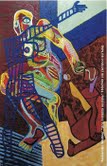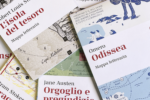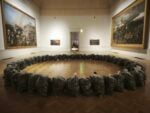Alexander Waltner – Una corazza sociale

Saranno presentati una ventina di nuovi dipinti, i cui temi fortemente simbolici e sensuali insieme alla tecnica pittorica caratterizzata da un acceso cromatismo ricordano la pittura espressionista tedesca e il movimento artistico CoBrA.
Comunicato stampa
6° Senso Art Gallery è lieta di invitarvi mercoledì 15 febbraio 2012 alle ore 19:00 all’inaugurazione della prima personale romana dell’artista austriaco Alexander Waltner. Saranno presentati una ventina di nuovi dipinti, i cui temi fortemente simbolici e sensuali insieme alla tecnica pittorica caratterizzata da un acceso cromatismo ricordano la pittura espressionista tedesca e il movimento artistico CoBrA. I dipinti di Alexander Waltner celebrano una completa libertà di forma e colore che ricorda i disegni infantili. I colori brillanti, le pennellate violente e le figure umane distorte caratterizzano le sue opere. I suoi dipinti di grandi dimensioni, realizzati in acrilico, rivelano il suo desiderio di lavorare espressivamente attraverso la propria fantasia con l’utilizzo di molto colore. La figura umana è trattata in maniera fortemente espressionistica e deriva dai suoi impulsi inconsci che istintivamente lo guidano alla realizzazione dell’opera. Attraverso le sue opere scopre probabilmente un nuovo modo creativo di sperimentare la vita. Il suo stile o atteggiamento può essere descritto come spontaneo, istintivo, selvaggio, vitale, colorato, provocatorio e sperimentale nell’ uso dei materiali. Il risultato artistico è la creazione di un mondo seducente, magico e pieno di piaceri sensoriali. L’ oggetto riflette la sua sensualità e la pennellata audace insieme alla tavolozza vivace è una testimonianza della sua energia dirompente.
Alexander Waltner è nato a Lauterach di Austria nel 1967. Nel 1994 inizia la sua carriera artistica a Vienna. Attualmente vive e lavora a Vienna.
Realizza numerose mostre nelle gallerie d’arte di Vienna e Bregenz
Nel 2006 e nel 2010 realizza due grandi mostre al Kunstlerhaus di Vienna
Ingresso libero
Orari mostra:
dal lunedì al sabato 11.00 − 19.00
domenica su appuntamento
PRESS RELEASE
EXHIBITION ALEXANDER WALTNER
FEBRUARY 15 - MARCH 10, 2012
6° Senso Art Gallery is pleased to invite you to the opening of the personal exhibition of the Austrian artist Alexander Waltner, on Wednesday, 15 February 2012 at 19.00. About twenty new paintings will be presented during his first personal exhibition in Rome, the strongly symbolic and sensual themes of which along with his painting technique characterized by a vigorous chromatism, recall the German expressionism and the CoBrA artistic movement. Alexander Waltner’s paintings celebrate a complete freedom of colour and form as if he has been also inspired by children’s drawings. Brilliant colours, violent brushworks and distorted human figures are evident in his artworks.
His mostly large scale acrylic paintings reveal his desire to work expressively using his fantasy and much colour. The human figure is being treated in a wildly expressionistic manner, deriving from his unconscious impulses that guide his hands while painting. Through his artworks he probably discovers a new creative way in experiencing life. His style or attitude can be described as spontaneous, instinctive, wild, vital, colourful, provocative and experimental in the usage of the materials. The artistic result is the creation of a seductive, magical world full of sensory pleasures. The subject matter reflects their sensuality and the bold brush strokes and vivid palette are a testament to his abundant energy.
Alexander Waltner was born in Lauterach of Austria in 1967. In 1994 his artistic career started in Vienna. He currently lives and works in Vienna.
He has held exhibitions in several galleries in Wienn and Bregenz
He has made two major exhibitions at Wienn Kunstlerhaus
POWERFUL
Text: Peter Bogner
Freely, and in the more recent paintings even more intensely perceptible, the unfettered, rotating, uninhibited pleasure of painting is manifested. The figure, often also several figures, and the painter are in the centre. He himself is the actively painting, analysing, directing master. Eros and tension – life and passion complement each other, often opposing and distancing counterpoints. To be highlighted is the great intensity of the figuration, which is expressed in a sensual longing for affection. The bodies present themselves full of openness and passionate abandon. And in the next moment disaffection and doubts become noticeable. It is the struggle of human existence with its calling. Various moods can be found in one and the same figure. Statures that find favour with themselves and proudly present themselves, rapt, self-absorbed – seemingly not taking note of the painter or us, the beholders – show themselves to us and sometimes one has the impression, the feeling that the models are observing us the same we look at them.
Alexander Waltner’s paintings are powerful. Powerful in their expressive force. Powerful in their chromaticity. Powerful in their substance. The artist, the individual stands for his work – and this in an immediate and open way. It is the individual in all his manifestations, perceptions, which provides the subject matter for all of the artist’s works. Yet one cannot simply rely on the material in these paintings. It must, however, be mentioned first since its selection is important for the great substance and meaning of the entire representation. It is a large endeavour, one that often tends to be expressive, imposing itself, to show human conditions and relations in complex situations. The human figure, the body is the central interest. It is relating to the human body in its original scale in art. In its archaic quality the bodies assume easily accessible, traditional poses which convey the content through their expressive gestures. Like primal symbols the bodies relate to each other in the painting, black contour lines marking several figures, while others are less concrete, less perceptible. The roles seem to be distributed yet they sometimes become blurred. Unclear tensions fill the scenes and lead into unknown depths of human existence. Powerful bodies, male and vital, are juxtaposed with passive, weak, suffering figures in rendition, defence, abandon and acquiescence. The entire action is pervaded by a sexual atmosphere and tension. The personal sexuality, the personal history, the personal experiences seem to become manifest. One notes a great fascination in the mode of representation, how power and suppression are expressed in the figures. This artistically heavy-laden and tense exploration produces an enormous desire for freedom. The desire for more information about one’s own history is overwhelming. And this desire is translated into painting. Lust for life and a blaze of colour give expression to the human figure. More freedom, more knowledge and exchange of figures raise the question, of such burning interest to Alexander Waltner, as to one’s own constantly continuing development and exploration of sexuality. Bifocal perspectives let the differences between man and woman blur and now it all simply revolves around human being and action. This persistent characteristic can be found in the paintings.
The effect is highlighted by the type of painting. A brushstroke applied with verve and the use of colour, guaranteeing the close-to-life feelings of sensitive, unknown human beings. In the dynamically applied brushstroke and often in a bizarre pose, the nude is presented in all facet of its being, its effect. Colour and body spaces result from the nuancing, the merging of intense luminous colour. Linear contours of colour offer a hold and lead to interpretations and references. Fulfilment is found in the colour. For Alexander Waltner painting is the mirror of life and the figures play the game of life in all unknown, unexplored possibilities. (Peter Bogner, director of the Künstlerhaus Vienna, March 2006)



